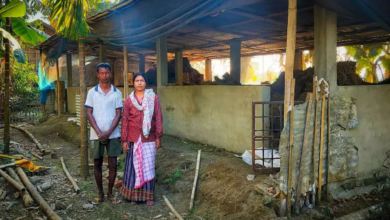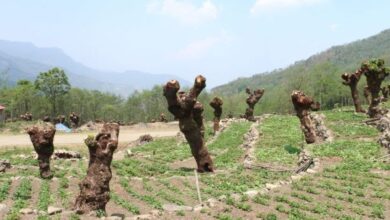A journey through darkness & stories of life
Jenifer Areng, who recently visited Cannes, talks about her movies & struggles as a filmmaker

Filmmaking is not only a passion for Jenifer Datta Areng but a way of evolving as a human being. To quote Spanish filmmaker Pedro Almodovar, cinema is a mode of filling in “the empty spaces of your life and your loneliness”, and Jenifer uses the creative tool to do that by connecting her emotional nodes to the neural system of society.
Born in Tura and brought up in several metropolitan cities, Jenifer was greatly influenced by the myriad colours of life and stories of people across the country and always felt the need for expressing them. Films gradually became her medium to do so.
“Both my parents were bankers. So, we kept moving from one city to the other. First, Kolkata, and then Mumbai. And these shifts would be fast. My father would come and tell us that we needed to shift in a week. So, definitely, the cities played an important role in influencing me to get into films,” told the 32-year-old filmmaker, who was just back from the Cannes Film Festival and is in Delhi at present.
Jenifer’s stories are deeply influenced by the claustrophobia and the emptiness that define life in cities where the struggle for survival takes over apparently inconsequential emotions. The disturbing images of loneliness — such as the ones in her first short fiction Little Things and the latest short film Tear — in her films leave a lasting impact on viewers.
“The stories came to me naturally and I never spared a thought on why. Now, I realise that my earlier stories were deeply influenced by city life and have a sense of being trapped in such existence. It was my feeling and I wanted to channelise that through the narratives and images. But now I want to tell different stories, and for me, it is a natural process,” said Jenifer, who never had any formal course in filmmaking other than a short diploma course in Mumbai. Little Things was made as part of the course in 2013 and it was screened at a festival at Satyajit Ray Film and Television Institute in Kolkata.
For most of her films, Jenifer was the one-woman army, doing both pre and post-production work as the shoestring budget did not allow her to have a big team. Later, she took up editing work in Mumbai and gathered much experience by working on several important projects, including a web series. When asked which part of the production work she enjoys the most, Jenifer asserted that as a filmmaker, “being part of the entire process is fulfilling”.
“So, it is really difficult to say whether I like direction, screenplay writing or editing. For me, being part of the entire film is more satisfactory than anything else. Having said that, I always get more editing work. I had been working with various agencies and companies since 2015,” she added.
For her last film Tear, Jenifer managed to get a producer and worked with names like Vinay Pathak. The story, set in Mumbai, is about a young woman Nina and her struggle with psychological turmoil, which has always been present in her storytelling as an undercurrent.
Psychological turmoil in her films
Jenifer was candid about her mental health problems and is currently undergoing therapy. “If I do not speak the truth about my mental health, then it will not be fair to my films. You will always find that emotional turmoil and that struggle with oneself in my films. It is unconscious,” she explained.
The young director’s experimental films also include a film poem that was made during the Covid-19 pandemic in collaboration with her brother and poet Avinab Datta Areng.
 Both the siblings were living in Mumbai when the pandemic hit and the country was shut down. It was then that Avinab wrote a poem on the experience and Jenifer decided to complete the cathartic process by making a film.
Both the siblings were living in Mumbai when the pandemic hit and the country was shut down. It was then that Avinab wrote a poem on the experience and Jenifer decided to complete the cathartic process by making a film.
“Initially, we thought we would not screen the film anywhere. But later we decided to send it to an online festival abroad. The experience and experiment were quite fulfilling,” said Jenifer, adding that her brother — who recently published his collection of poems, Annus Horribilis, with Penguin India — has always been a great support in nurturing her creativity. Both Jenifer and Avinab are thinking of collaborating more in the future.
So far, Jenifer has made five short films and experimented with multiple languages, such as Bengali, Marathi and Hindi. Currently, she is working on a Garo short film. “Tura is home for me and I long to go back to my roots. I want to make films in and about Meghalaya. So, this Garo project is a natural transformation from the stories of cities,” said the filmmaker, who has been “greatly influenced by French films that opened the door to world cinema for me”.
Filmmaking, however, takes a backseat for Jenifer at times because of the financial struggle and she has to often juggle jobs, family business and her creativity. She is helping her mother run a homestay business in Tura where her parents have settled after retirement.
Cannes experience
Talking about her Cannes visit, Jenifer said she came back from the world’s biggest film festival with a “bagful of experiences”.
“The Cannes festival happened as part of a project. I have been collaborating with some people abroad for financing my new feature film. My project was chosen and I was told that I would be taken to a festival. But never did I think that it would be the biggest film festival,” she laughed.
As she spoke about her new project, she rued the lack of awareness and acceptance of unconventional storylines in the country. “The way I narrate my stories is not suitable for commercial purposes. Hence, getting domestic producers becomes a problem. But these scripts will have more acceptance outside the country. The Cannes experience may help me take the project ahead,” she added.
Meghalaya calling
As Jenifer plans to go back to her home state Meghalaya, she said she is also aware of the struggles of filmmakers, especially the independent ones. She is also aware of the draft film policy that the government is reviewing. According to her, stakeholders in the industry should work hand in hand to make the policy a reality.
“Dominic (national award-winning director Dominic Sangma) made me a part of the film society that is based in Tura. I have read its suggestions and I wish to meet all those who are working on this when I visit Tura. The policy is a necessity for local filmmakers. Also, we barely have anything to encourage arts in the North East and we need something, such as a good arts institute,” she observed.
Jenifer is currently working on the script of the Garo short film and is planning to visit Tura for the project. “I have always liked visiting home, especially during Christmas. This time, both my brother and I will visit,” she added.
From metropolitans to Meghalaya, Jenifer’s journey is as much about struggles and creative survival as that of fulfilment. Despite a lack of funds and the pressure from her family to have a secured and settled life, Jenifer is determined to continue her journey as a filmmaker. “Telling stories is what helps me cope with my problems and overcome the darkness. It becomes difficult at times but that is my calling,” she added.
~ Team Sunday Monitor
~ Photos sourced





